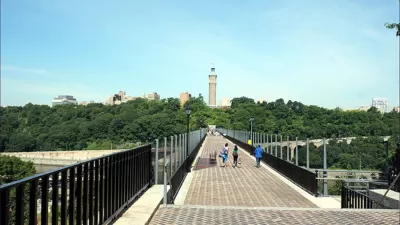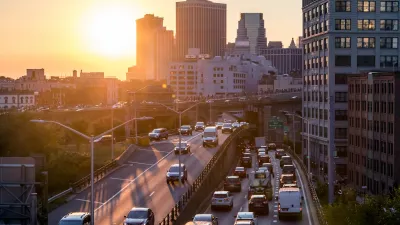Like so many other transportation policies, congestion pricing risks being sold for the wrong reasons.

Charles Komanoff, founder-director of the Carbon Tax Center, writes for Streetsblog NYC on the hot-button of topic of congestion pricing, elucidating the effects of congestion pricing relative to carbon emissions, congestion, and quality of life.
Here's how Komanoff summarizes the effect a particularly ambitious congestion pricing scheme could have on New York's emissions:
The most sweeping congestion pricing plan proposed for New York City, Move NY, will cut tailpipe emissions of carbon dioxide, the main greenhouse gas, by an estimated 950,000 metric tons a year. A little over half of that reduction, 55 percent, results from fewer auto trips from the toll disincentive along with transit improvements funded by toll revenues. The remaining 45 percent comes from smoothed traffic flow, as the lessening in stop-and-go traffic translates into better fuel economy and, thus, lower per-mile emissions.
But, according to Komanoff, "Move NY will shave just 2 percent from the total and 6 percent from the transportation part — reductions somewhere between 'modest' and 'helpful,' and well short of game-changing."
This isn't an argument against congestion pricing—instead Komanoff's argument shifts the focus to the many substantial benefits of congestion pricing that won't necessarily be measured by reduced automobile trips. While it won't stop everyone from driving, congestion pricing will make it easier for everyone to get around, writes Komanoff in a rephrasing of the "moving people, not cars" formula (recently put to the test in Virginia, to headline-friendly effect).
The true climate pay-off, according to Komanoff, is in a city that functions better and "in the thousands of households, jobs, and activities that will locate or remain in the city, rather than fleeing our crushing gridlock and dysfunctional subways for the new exurban ring or the Sunbelt or even the inner suburbs, which aren’t 'inherently green' like NYC and have carbon footprints many times larger than New Yorkers."
FULL STORY: Congestion Pricing Will Help Stop Climate Change — But Differently Than You Think

Planetizen Federal Action Tracker
A weekly monitor of how Trump’s orders and actions are impacting planners and planning in America.

Maui's Vacation Rental Debate Turns Ugly
Verbal attacks, misinformation campaigns and fistfights plague a high-stakes debate to convert thousands of vacation rentals into long-term housing.

San Francisco Suspends Traffic Calming Amidst Record Deaths
Citing “a challenging fiscal landscape,” the city will cease the program on the heels of 42 traffic deaths, including 24 pedestrians.

Amtrak Rolls Out New Orleans to Alabama “Mardi Gras” Train
The new service will operate morning and evening departures between Mobile and New Orleans.

The Subversive Car-Free Guide to Trump's Great American Road Trip
Car-free ways to access Chicagoland’s best tourist attractions.

San Antonio and Austin are Fusing Into one Massive Megaregion
The region spanning the two central Texas cities is growing fast, posing challenges for local infrastructure and water supplies.
Urban Design for Planners 1: Software Tools
This six-course series explores essential urban design concepts using open source software and equips planners with the tools they need to participate fully in the urban design process.
Planning for Universal Design
Learn the tools for implementing Universal Design in planning regulations.
Heyer Gruel & Associates PA
JM Goldson LLC
Custer County Colorado
City of Camden Redevelopment Agency
City of Astoria
Transportation Research & Education Center (TREC) at Portland State University
Jefferson Parish Government
Camden Redevelopment Agency
City of Claremont





























